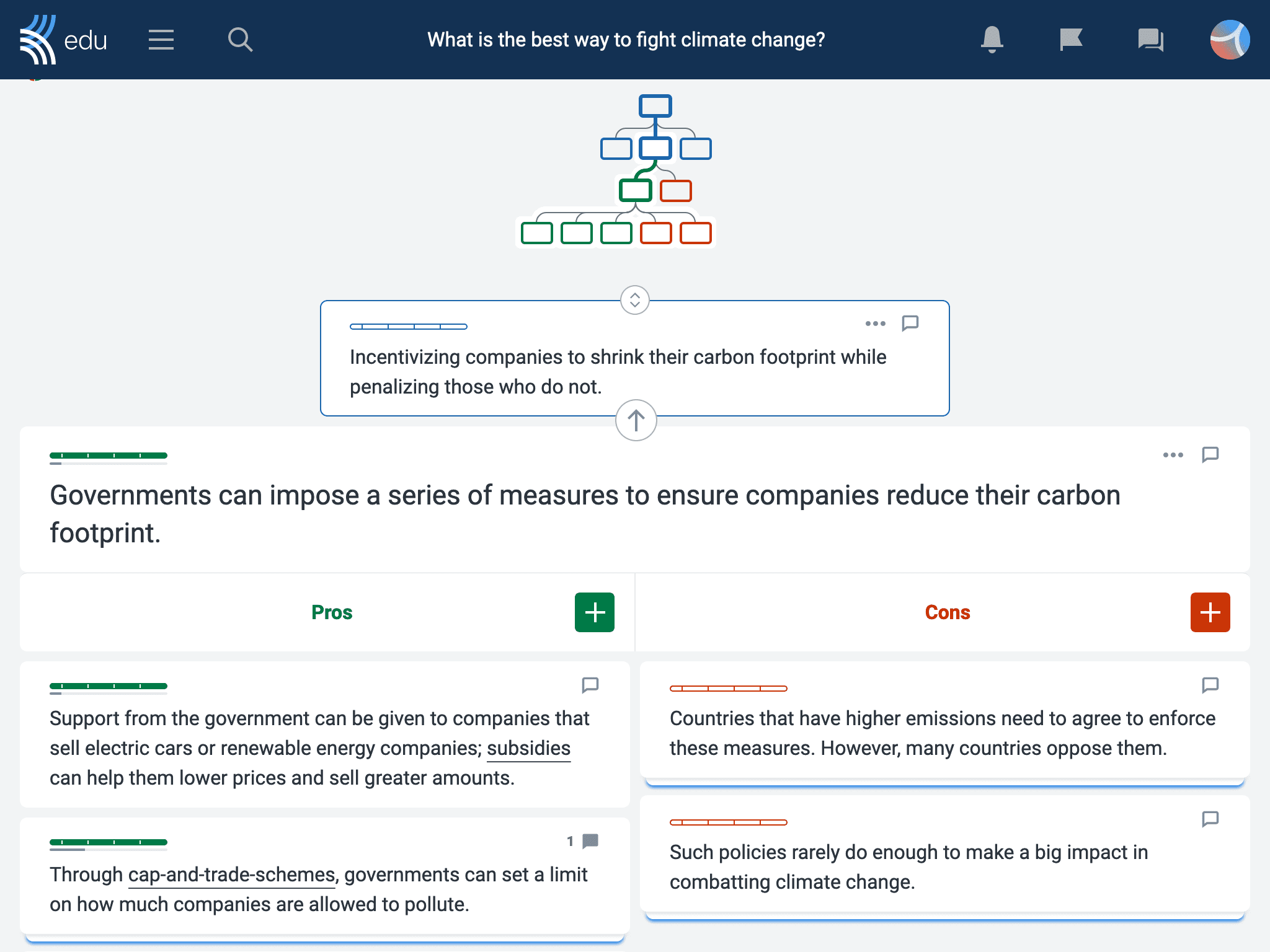If you were to create your ideal citizen, which qualities would you include? We bet citizens who are informed, engaged, and accountable feature somewhere on your wishlist. The good news is that you have the power to help build these qualities in your students through teaching civic literacy!
Let’s explore the elements of civic literacy and examine how Kialo Edu can help empower students to become active citizens in society.
Why should I teach civic literacy skills?
Teaching civic literacy has the power to combat young people’s increasing disillusionment with democracy. In fact, the only other place with such power over students’ behavior and attitudes may be the online world, making it crucial for schools to deliver reliable information about the true benefits and challenges of democracy.
And just as civic literacy skills are weaved into every part of society, they can also be weaved into many curriculum areas. Connecting elements of civic literacy to something they’re familiar with gives students a deeper understanding of what it’s like to be an active citizen in a democratic society.
What are the elements of civic literacy?
Developing civic knowledge and active community engagement
Even for the most well-informed citizens, the inner workings of governmental and community systems and institutions can be baffling. For students, this can stop civic engagement before it starts. Thus, equipping them with civic knowledge is crucial.
Students are often motivated by knowing “what’s in it for them,” so teaching about their rights within a democratic society can help them see the benefits of democracy. Learning about the associated responsibilities demonstrates that everyone has a role in ensuring democratic values are upheld.
But students need more than just passive acquisition of knowledge — they need to know that their actions matter. By teaching students to apply their knowledge through engaging in their community, you can empower them to make positive contributions to democratic society.
Building communication and collaboration skills

Communication and collaboration are skills that lie at the heart of a healthy democratic society, and the classroom provides a safe space for students to practice these skills. This is especially important for students raised in an online world of likes, dislikes, and sometimes thoughtless or inflammatory comments.
Educators can develop students’ communication and collaboration skills by teaching them how to use free speech to present a well-reasoned viewpoint or line of argumentation supported by carefully chosen, reliable evidence.
Moreover, collaboration towards a common goal is a cornerstone of civic literacy that educators can help facilitate. Give students opportunities to participate in constructive discussions where they can share views respectfully and listen actively to each other. During collaborative activities, teach students to value the diverse perspectives that their peers bring to activities.
Not only will these skills support students in becoming active citizens, they will be invaluable to students in their future academic and professional lives — and you should be able to reap the benefits in your classroom!
Improving knowledge of current events and developing media literacy skills
While technology has many benefits, it could also be one of the biggest threats to democracy, making media literacy skills a vital part of civic literacy lessons and especially relevant to today’s students. Up-to-date knowledge on current events is crucial for students to offer informed contributions to discussions, make connections between events, and understand the challenges faced by society.
It should come as no surprise that many young people rely on social media for information on current events. However, students may not realize online content on current events is driven by algorithms and filter bubbles.
Thus, teaching students how to identify and engage with trustworthy news sources is essential for civic literacy. Furthermore, students should be able to critically evaluate information, differentiate between fact and opinion, and recognize bias. This helps equip them with the tools needed to identify misinformation and disinformation.
How can Kialo Edu support civic literacy education?
Educators can target a range of civic literacy skills with Kialo Edu. Our discussions are designed to train critical thinking — a key skill for civic literacy. Through Kialo’s argument mapping structure, students learn to develop reasoned lines of argumentation in open-ended discussions.

Collaboration is encouraged throughout discussions as students express their opinions, listen actively to other perspectives, compromise over ideas, and work towards developing solutions. Students can even flex their voting muscles by voting on the validity of each other’s claims.
The digital nature of discussions makes them perfect for developing media literacy skills. Encouraging students to select reliable evidence to support claims allows them to apply their evaluation skills and practice identifying mis- and disinformation. Furthermore, students can engage in respectful online communication though commenting on claims.
And as Kialo Edu’s topic library has its very own Civics and Society section, you can teach civic literacy skills through discussions on the topic of civics itself! Try holding a discussion on whether democracy is a good form of government or whether justice is more important than peace. There’s a host of topics linked to other curriculum areas too, making it a breeze to weave civic literacy into the wider curriculum.
We hope you feel empowered to develop civic literacy skills with your students, and in turn, empower them! Students who can take a stand on and engage with community issues, communicate in an informed, respectful way, and be accountable citizens are students that you can be proud of.
We would love to hear the difference that civic literacy is making in your school community. Contact us at feedback@kialo-edu.com, or on any of our social media platforms.

